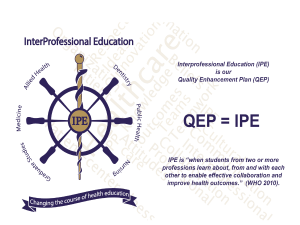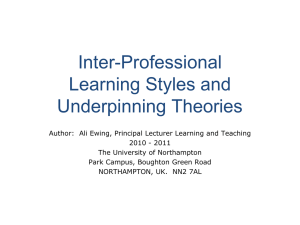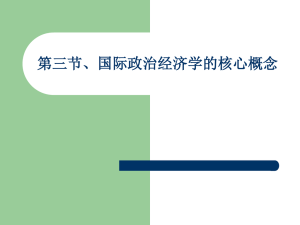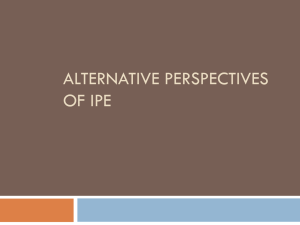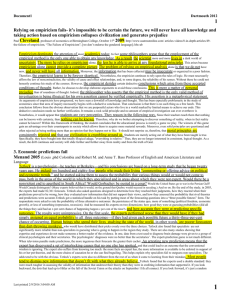International Political Economy
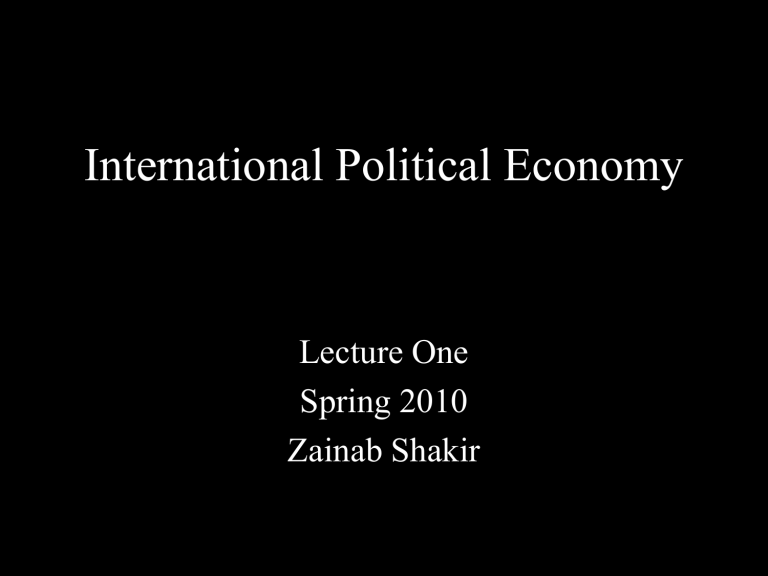
International Political Economy
Lecture One
Spring 2010
Zainab Shakir
International Political Economy
Course Outline
Spring 2010
Instructor: Zainab Shakir
Email: zaynab.shakir@gmail.com
Consultation: by appointment
Course description:
We are living in a very interesting time to study International Political Economy (IPE)—the politics of global economic relations. This course, as an introduction to IPE, first introduces three major IPE theories—Mercantilism, Liberalism, and Marxism—as well as fundamental IPE structure in trade, finance, and security (such as WTO, IMF, and UN). It then focus on key issues in the on-going
“Globalization” debate—its significance, sources, and consequences. Topics include poverty and development; multinational corporations (MNCs); transition economies and environment problems.
Textbooks:
Introduction to International Political Economy , Balaam and Veseth (Fourth edition: 2008)
Requirements:
(1) My expectations are that you will finish the readings in advance and come to class on time.
Without doing both, you are not likely to do well in the exams. Exams will be based on the course readings, lectures, and class discussions. There will be no “make-up” examinations for anyone missing the exams without prior approval of the professor, except due to extenuating circumstances beyond the student’s control, such as medical emergencies.
(2) To maximize your learning from this course, I strongly encourage your active participation in class discussion. Please feel free to ask questions during the lecture and after class.
Assignments:
(1) Midterm exam and final exam: in class examination
(2) Presentations: You will be involved in a group presentation on one topic relevant to IPE. Each group will present to the class for 20 minutes.
Grading:
Midterm Exam 30%
Final Exam 40%
Presentation 20%
Attendance and Class Participation 10%
Intended Learning Outcomes:
By the end of the semester, students should be able to:
1.
Demonstrate a comprehensive knowledge of key concepts, major theories, and main structure, and important issues of IPE
2.
Be able to use major IPE theories to evaluate and analyze current events in global political economy and make clear argument.
3.
Conduct research through collection, analysis and organization of information and ideas.
4.
Demonstrate sufficient presentation skills in English.
What is International Political Economy?
•
The Politics of Global Economic Relations
•
The study of a fundamental tension between and the dynamic interaction of two spheres of life, which we can variously call “society and individuals”,
“politics and economics”, or “states and markets”.
•
Any way you say it, political economy is about the lines that both connect and divide national interest from individual self interest.
Society Individuals
Politics
States
Economics
Markets
What is IPE?
•
One way to understand the basics of IPE is to pick apart its name.
• It is INTERNATIONAL meaning it deals with issues that cross national borders and with relations between and among nation states.
• It is POLITICAL in that it involves the use of state power to make decisions about who gets what, when and where in a society. The political process is complex and multi layered, involving nation states, bilateral relations among nation states and many international organizations, regional alliances, and global agreements.
•
Lastly, IPE is about the ECONOMY or economics which means that it deals with how scarce resources are allocated to different uses and distributed among individuals through the decentralized market process.
•
Economic analysis and Political analysis often look at the same questions but economic analysis focuses less on issues of power and national interest and more on issues of wealth and income and individual interest.
•
Political economy, therefore, combines these two ways of looking at the world in order to grasp more fully society’s fundamental nature.
First Principles: States and Markets
• Think of political economy as the field of study that analyses the problems and questions arising from the parallel existence and dynamic interaction of “state” and “market”in the modern world.
• Political economists focus on the basic conflict that exists between the interests of the individual and the broader interests of the society in which that individual exists.
• To put this in another way, political economy is the study of the tension between the market , where individuals engage in self interested activities and the state , where those same individuals undertake collective action which is in the national interest or in the interest of a broadly defined community or ‘society’.
• In short, political economy looks at the fundamental tension between economics and politics.
First Principles: States and Markets
STATE:
•Realm of collective action and decision.
•By state, we usually mean political institutions of a modern nation state, a geographic region with a relatively coherent system of government that extends over a region.
MARKET:
Realm of individual action and decisions.
•By market we usually mean the economic institutions of modern capitalism.
•The market is the sphere of human action dominated by individual self interest and conditioned by forces of competition.
SOCIETY contains BOTH state and market elements.
•The parallel existence of states (politics) and markets (economics) creates a fundamental tension that characterizes political economy.
•States and markets do not always conflict , but they do overlap to such a degree that their fundamental tension is apparent.
The Geometry of IPE
SOCIETY
ECONOMICS
INTERNATIONAL
POLITICAL
ECONOMY
POLITICS
CASE STUDY: The United States, China and the MFN Issue
WASHINGTON, May 26-President Clinton’s decision to renew China’s trade benefits was the culmination of a titanic clash between America’s global economic interests and its self image as the world’s leading advocate of human rights. In the end, economic interests won the day.
The New York Times, Friday 27 May 1994
•The issue is complex but clearly important.
•President Clinton had to chose between two conflicting national interests. The economic interests of both the US and China would be best served by granting
Chinese goods favorable entry into the US market, a condition termed most favorable nation or MFN status. China, however, had a record of violating human rights as they are defined by western culture. It was a long standing US policy to deny MFN status to countries that violate human rights standards.
•President Clinton’s dilemma was an example of the tension between economics and politics, two spheres of human life that often intersect.
•In making his choice, President Clinton had to take into account the many to account many types of interactions between China and the US, and the impacts they have on other nations. He also had to weigh historical factors and deep cultural differences.
•In the end, he chose to extend MFN status to China, satisfying some economic and political interests despite China’s lack of progress on human rights.
Susan Strange: IPE Defined
•Professor Susan Strange at the London School of Economics and Political
Science has written that IPE
Concerns the social, political, and economic arrangements affecting the global systems of production, exchange and distribution and the mix of values reflected therein. Those arrangements are not divinely ordained, nor are they outcome of blind chance. Rather they are the result of human decisions taken in the context of man made institutions and sets of self set rules and customs.
•This definition of IPE gives equal weight to social, political and economic arrangements and stresses that IPE is not just the study of institutions or organizations but also of the values they reflect.
•States and markets are connected by “global systems of production, exchange, and distribution” which are termed as the STRUCTURES of the IPE.
•IPE therefore, looks at the ways that the states and the markets of the world are connected to one another and the arrangements or structures that have evolved to connect them.
•These arrangements reflect history, culture and values. They change, and will continue to change in the future.
The Structures of International Political Economy
•
The international political economy is a network of bargains between and among states (that deal in power) and markets (that deal in wealth). These bargains determine the production, exchange, and distribution of wealth and power.
•
Bargains can take many forms. Some are formal agreements signed, ratified and enforced. Other bargains are merely conventions, understandings or rules of thumb.
•
Some IPE bargains reflect what Professor Strange calls RELATIONAL
POWER , which is the power of one player to get another to do or not do something.
•
However, what is increasingly important in IPE, according to Professor
Strange is STRUCTURAL POWER , which she defines as ‘ the power to shape and determine the structures of the global political economy within which other states, their political institutions, their economic enterprises and their scientists and professional people have to operate’.
• In a sense, these structures are the institutions and arrangements that govern the behavior of states and markets in the international political economy, which together produce, exchange and distribute wealth and power.
The Structures of the International
Political Economy
• The four global structures are:
SECURITY PRODUCTION
FINANCE KNOWLEDGE
The Security Structure
• Security from natural forces or from the threats and actions of others is perhaps the most basic human need.
• When one person or group provides security for another or contributes to that security, a security structure is created.
• The nature of the security structure was a contributing factor in the debate over China’s MFN status in 1994. Sometimes China has been thought of as a threat to US security interests, at other times it has been seen as a part of a trilateral balance of power along with the US and the Soviet Union.
• Until the 1970s, all trade with China was forbidden for national security reasons. Although this ban is now gone, it is clear that uncertainty and doubt remain regarding what threat, if any, China represents to the US. This security question tempers to some degree relations between the US and China in all areas.
The Production Structure
• The Production Structure can be defined as the sum of all arrangements determining what is produced, by whom and for whom , by what methods and on what terms. Production is the act of creating wealth and wealth is nearly always linked to power. The issue of who produces what and for whom therefore lies at the heart of international political economy.
• Recent decades have seen dramatic changes in the production structure with the production of certain high value products such as cars shifting from the US to Japan and now to other countries including Korea,
Mexico and China.
• These structural changes affect the distribution of wealth and power in the world and therefore impact the other structures of IPE.
The Finance Structure
• The pattern of money flows between and among nations.
• Defines who has access to money, how and on what terms.
• Money directly amounts to wealth and is therefore central to IPE.
• Can you think of any transfers of money between nations that actually take away from the wealth of the recipient nation?
The Knowledge Structure
• Knowledge can lead to wealth for those who can use it effectively.
• Who has knowledge and how it is used is therefore an important factor in IPE.
• Nations with poor access to knowledge in the form of industrial technology, scientific discoveries, medical procedures, or instant communications for example, find themselves at a disadvantage relative to others.
• One reason China desired MFN status in 1994 was that it hoped that increased economic interaction with the US would give it greater access to industrial technology. To move up in the international production structure, China needed to accelerate its acquisition of science,technology and know how from abroad.
Theoretical Perspectives on IPE
• Variety of theories that attempt to describe how states and nations should interact or how they really do behave.

